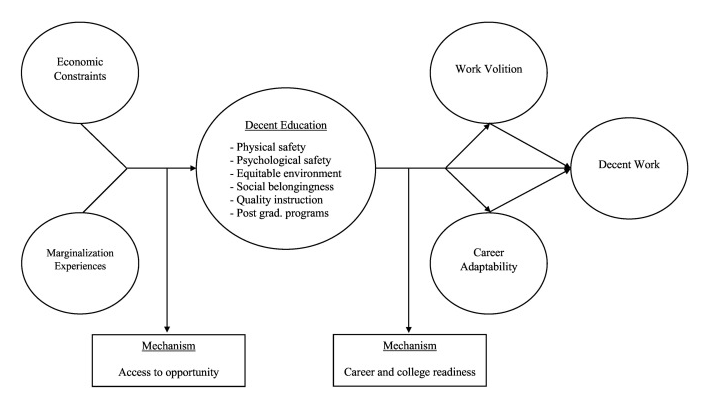Relationship Between Decent Work and Decent Education
This project was awarded the Distinguished Student Research Award by Korea Employment Information Service in 2024.

The recent expansion of the psychology of working theory (PWT; Duffy et al., 2022)1 introduces the concept of decent education to more fully explain how educational experiences influence career outcomes and overall well-being. Decent education encompasses not only formal schooling but also access to skill development, vocational training, and other learning opportunities that enable individuals to secure stable and meaningful employment. Within this framework, decent education functions as a foundation that equips people with the resources, knowledge, and competencies needed to navigate the labor market effectively.
In this study, we applied the expanded PWT model to young adults in South Korea to examine whether pathways to decent work differ by gender. Our analysis focused on whether work volition and career adaptability mediate the link between decent education and decent work. Data were drawn from the Youth Panel Survey 2021 (Hwang et al., 2021)2, which included 3,403 Korean young adults employed in regular positions (정규직 in Korean). The sample comprised 1,901 women and 1,502 men, with a mean age of 25.32 years.
We are currently preparing for submission based on the analyzed results.
- Bae, I., & Im, G. (in progress). Relationship between decent education and decent work for youth: Mediating effects of work volition and career adaptability.
- Bae, I., & Im, G. (2024, June 5). Relationship between decent education and decent work for youth: Mediating effects of work volition and career adaptability [Paper presentation]. 2024 Employment Survey Conference, Seoul, South Korea.
Footnotes
Duffy, R. D., Kim, H. J., Perez, G., Prieto, C. G., Torgal, C., & Kenny, M. E. (2022). Decent education as a precursor to decent work: An overview and construct conceptualization. Journal of Vocational Behavior, 138, 103771.↩︎
Hwang, G., Gong, J., Cho, Y., Jung, K., & Cho, C. (2021). Youth Panel Survey 2021. Korea Employment Information Service.↩︎